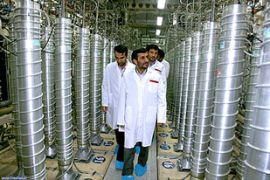Iran snubs proposed nuclear talks
President says no more discussions on nuclear issue as UN watchdog admits “stalemate”.

‘Stalemate’
They also come as Mohamed ElBaradei, the head of the UN’s International Atomic Energy Agency, admitted on Monday to a “stalemate” in efforts to resolve questions over Iran’s nuclear programme.
An August 28 report by the UN nuclear watchdog said Iran had granted the agency’s demand for tighter monitoring of its Natanz nuclear fuel production site and restored some IAEA access to a heavy-water reactor site of proliferation concern.
 |
| ElBaradei says Iran has boosted its potential enrichment capacity by eight times [AFP] |
But it also said Iran had increased its number of installed centrifuge machines by 1,000 to 8,300, boosting potential enrichment capacity, and was still blocking an IAEA inquiry into allegations it has tried to “weaponise” the enrichment process.
Except for Iran’s two new gestures of co-operation, “on all … issues relevant to Iran’s nuclear programme, there is stalemate”, ElBaradei said in remarks opening a quarterly meeting of the IAEA’s 35-nation board of governors on Monday.
In particular, he highlighted the blocked weaponisation inquiry, Iran’s refusal to suspend enrichment as demanded by the UN Security Council, and its failure to adopt an IAEA protocol permitting inspections beyond declared nuclear sites.
Monday’s developments come just a week after Iran’s senior nuclear negotiator, Saeed Jalili, said his country was ready for fresh talks with world powers over its nuclear programme.
Jalili had said Iran had revised its proposal to the West and hoped “a new round of talks will be held for reaching a world full of progress and justice”.
Ahmadinejad’s latest comments and Elbaradei’s report provide fodder for Western powers trying to persuade Russia and China to back tougher sanctions against Iran.
Sanctions threat
Western nations, which suspect Iran is seeking to produce nuclear weapons, had given Tehran until the UN General Assembly meeting which goes from September 23-25, to take up an offer of talks on trade benefits if it stops uranium enrichment, or face harsher sanctions.
But Ahmadinejad said on Monday that “co-operation based on respect and justice is contradictory to setting a deadline”.
Instead, he invited officials from the so-called six powers – the US, Britain, China, Russia, France and Germany – to take a look at Iran’s forthcoming package of proposals addressing the “main challenges facing humanity”.
Iran is ready to negotiate and co-operate on making “peaceful use of clean nuclear energy” available for all countries and in preventing the spread of nuclear arms, he said.
The semi-official ISNA news agency said Iran was likely to unveil the package by the end of this week.
Iran, which has always maintained that it seeks nuclear technology only to make electricity, has often said nuclear arms have no place in its defence doctrine and has called on the US and other countries with such weapons to dismantle them.
The UN Security Council has already imposed three sets of sanctions on Iran since 2006, targeting Iranian companies and individuals linked to the nuclear programme.
It may next impose sanctions against petrol imports into Iran, which although the world’s fifth biggest oil exporter, imports up to 40 per cent of its petrol.
In an apparent move to counter any such sanctions, Iranian media reported that Venezuela had pledged to export 20,000 barrels of petrol a day to Iran, in a deal struck during a visit by Hugo Chavez, the Venezuelan president, on Sunday.